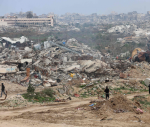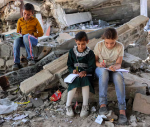You are here
Authorities missed chance to improve Penal Code —HRW
By Rana Husseini - Jan 27,2016 - Last updated at Jan 27,2016
AMMAN — The government in 2015 missed an opportunity “to remove vague and overly broad charges in the country’s Penal Code and counterterrorism law that are used to curtail free expression”, Human Rights Watch has said.
In its 2016 World Report, the group called for revising the Anti-Terrorism Law and the Penal Code to better safeguard human rights, while praising progress made in this file.
Meanwhile, the government is currently reviewing the report, an official said.
“We are reviewing the report with the concerned government committees and we will coordinate our work to follow up on the points mentioned there,” said Basil Tarawneh, the government’s coordinator on human rights, on Wednesday.
The official stressed that the Jordanian government is keen on protecting the human rights and dignities of people in Jordan.
“Jordan prosecuted activists, dissidents, and journalists for speech offenses, relying largely on 2014 amendments to its counterterrorism law that broadened the definition of terrorism and included acts such as ‘disturbing [Jordan’s] relations with a foreign state’,” HRW charged.
“Jordan’s concerns over its security situation shouldn’t translate into branding journalists and dissidents as security threats merely for doing their jobs or expressing themselves peacefully,” Sarah Leah Whitson, Middle East HRW director, was quoted as saying in a statement.
“Jordan should revise its terrorism law and penal code to remove vague language used to limit peaceful speech,” Whitson added.
In the 659-page World Report 2016, its 26th edition, Human Rights Watch reviews human rights practices in more than 90 countries, according to the HRW statement.
Jordan curtailed media freedom in 2015 by detaining and bringing charges against at least nine journalists and writers, in some cases under the counterterrorism law, the HRW statement said.
It added that the government failed to amend or remove “articles long used by authorities to limit free expression” when a Justice Ministry committee issued in May a proposed penal code overhaul that would amend at least 180 articles of the 1960 law.
The statement went further to criticise the execution of 13 people, including two Iraqis, in December 2014 and February 2015.
The watchdog also underlined the government’s handling of the crossing of Syrian refugees into Jordan.
Jordan hosted over 633,000 Syrian refugees in 2015, the statement said, referring to those registered with the UNHCR, while the actual number of Syrians in Jordan is around 1.3 million, around 85 per cent of whom live in host communities and urban centres.
“Beginning in March, Jordanian authorities severely restricted informal eastern border crossings, stranding hundreds of Syrians in remote desert areas just inside Jordan’s border for days and weeks with limited access to food, water, and medical assistance,” according to the HRW statement.
Officials have said that as this group comes from areas in northeast Syria under Daesh control, screening needs longer time, adding that 50-100 people are allowed into Jordan every day, while military and government agencies, along with NGOs, are supplying these refugees with essential relief aid, including food and blankets.
Moreover, HRW charged that the Jordanian authorities in 2015 initiated a “re-verification process” for all Syrians living in urban communities, requiring Syrians to prove they had proper documentation and legal status in order to obtain a service card that will later be required to receive humanitarian assistance, access medical care, or enrol children in public schools.
The re-verification process adversely affected undocumented Syrians and those who left refugee camps irregularly, leading to cases of forced encampment in largely closed refugee camps, HRW said.
Aid workers and Syrian refugees confirmed that deportations of Syrians and Palestinians back to Syria occurred during the year, the statement added.
“Jordan blocks Palestinians from Syria from entering the country, and detains and deports back to Syria Palestinians who enter at unofficial border crossings using forged Syrian identity documents, or those who enter illegally via smuggling networks,” HRW said.
Turning to domestic workers, HRW said Jordan hosted around 80,000 migrant domestic workers in 2015, mostly from the Philippines, Sri Lanka, and Indonesia.
Nongovernmental organisations repeatedly referred domestic workers who had suffered multiple abuses to Labour Ministry investigators who, however, rarely classified them as victims of the crime of trafficking, HRW claimed.
Instead, it added, they treated each aspect of abuse, such as non-payment of salaries, separately, sometimes even detaining workers for “escaping” employers.
Meanwhile, HRW criticised Jordan for the state’s failure to grant citizenship to spouses and children of Jordanian women married to non-Jordanians.
But HRW praised the government for introducing special privileges for non-citizen children of Jordanian women, including free education and access to health services in government institutions, as well as provision of Jordanian ID cards and drivers’ licences.
Penal Code articles 98 and 340, which allow reduced sentences for perpetrators of “honour crimes”, remained in force, HRW stated.
News reports indicated that at least 10 women and girls were killed by male family members in 2015, including a woman shot four times by her father after leaving her family home and reportedly having a relationship with a man her family refused to let her marry, according to HRW.
Perpetrators of torture or other ill-treatment appeared to enjoy impunity due to the authorities’ reliance on special police prosecutors and judges to investigate allegations against, prosecute, and try fellow officers, HRW stated.
At the Police Court, where many such cases are heard, “two out of three sitting judges are serving police officers appointed by the police, and authorities rarely release information on the results of Police Court trials”.
“To date, HRW has not received evidence that a police or intelligence officer has ever been convicted of torture under article 208 of the Penal Code,” the organisation claimed.
Related Articles
AMMAN — Human Rights Watch (HRW) called for an updated penal code that would “better protect human rights,” in a letter sent to Prime Minist
AMMAN — Human Rights Watch (HRW) on Monday criticised the authorities in Jordan for levelling criminal charges against a journalist and a un
AMMAN — Human Rights Watch (HRW) group on Wednesday commended the Jordanian Parliament for approving a series of important human rights refo















